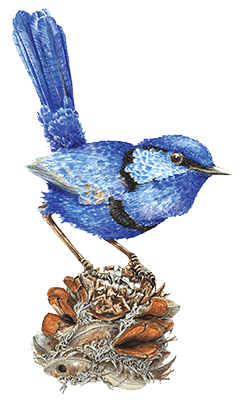Sponsored Restoration Project
The BC25 Organising Committee is now inviting applications for ecological restoration projects in Western Australia that would like to partner with us and our Nature Positive Diamond Sponsor, Ecocene, in our effort to offset the environmental impact of the BC2025 conference being held in Perth from 28–30 October.
BC25 is an exciting event, bringing together custodians, researchers and practitioners from across Country, academia, government, industry and community to share knowledge to protect, conserve, and enhance our incredible biodiversity. In a rapidly changing environmental and political landscape we need to employ a diverse array of strategies to curb our impacts on the environment and pivot to a Nature Positive future.
We recognize, however, that large events such as this have a significant environmental impact, and that the nature of our mission brings a unique responsibility to offset this impact to the greatest extent possible. In addition to choosing environmentally friendly alternatives where feasible to reduce the footprint of BC25, we also seek to mitigate the conference’s impact by investing in ecological restoration in Western Australia. Aligned with our conference theme of ‘Nature Positive’ we don’t want to solely focus on carbon sequestration; we have decided to take a broader approach and directly support a restoration project in order to contribute to ecological and social goals at the same time.
Overview of the Program
Thanks to our Nature Positive Diamond Sponsor, Ecocene, in 2025 we are able to run our inaugural Biodiversity Conference Restoration Project. The funds from the Nature Positive Diamond Sponsorship will go directly to a restoration project located in Western Australia to offset the carbon and nature impacts from the conference.
To select the project that will receive the funds, we are running an open call for proposals as detailed below. The total value of the awarded restoration project is up to $20,000 inc. GST. The funds can be used to expand an existing project or be stand alone.
Once the application period closes, the Biodiversity Conference 2025 Organizing Committee will select the recipient. We will invite the successful group to develop some communication materials about the project to share with delegates via the conference website, and at the conference itself.
Awarded Project
- The selected project will receive exposure at the conference and will be featured as part of conference activities.
- We will include project information on the conference website and on the conference program flyer.
- Representatives from selected project will be invited to prepare a poster presentation for display at the conference.
How to Apply
- Please complete the online project form (in English): [Submit Application]
- Information provided on the submission form should be clear and complete, adequately explaining each facet of the project.
- Please submit at least two high-resolution images (via the image upload feature provided on the submission form). Images could be:
- Photos of the site (e.g. sequences of recovery at the site; use of the restored site by native fauna; people conducting restoration activities at the site; and/or the connection between the project and local communities).
- Maps of the site and planned activities.
- Other communicative diagrams.
- The deadline to apply is 21 March 2025.
- Attendance at the conference by a representative of the project while not compulsory is highly encouraged.
Weighting Criteria
Commencing or ongoing (i.e. in progress and not yet completed) ecological restoration projects located in Western Australia are the only projects eligible under this program.
Projects submitted will be weighted following the below criteria. Given the size and diversity of ecosystems in Western Australia, and the kinds of restoration projects available, we do not expect all criteria will be met in all cases. The information being gathered is intended to characterise your project for comparative purposes and for the judging panel to quickly understand its scope.
- Projects that will be certified for Australian Carbon Credit Units (or similar trading units) will be weighted higher.
- Local projects (Swan Coastal Plain) or projects targeting Threatened Ecosystems, flora or fauna will be weighted higher.
- Restoration on Indigenous lands, Indigenous-led or Indigenous co-designed will be weighted higher.
- Project designed and implemented in accordance with the SER International Principles and Standards for the Practice of Ecological Restoration or the related Australian Standards will be weighted higher.
- Projects that link practice and research together will receive additional points.
